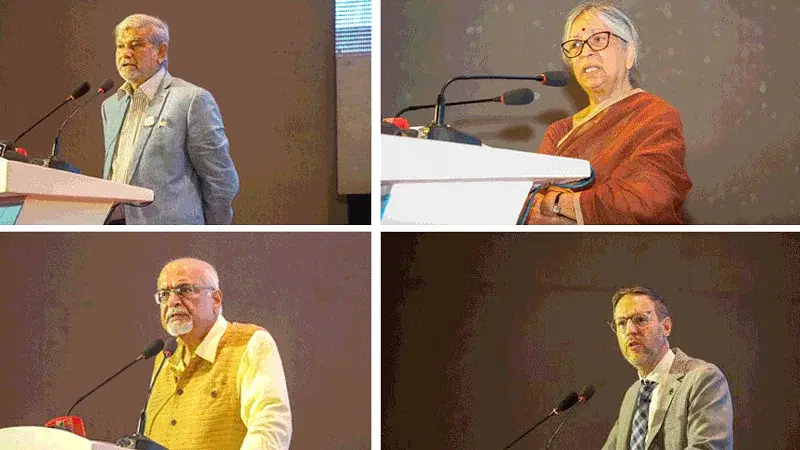
Youth conference
Let youths’ voice be included in state governance
Youth has to practice their civil rights by being involved in the state’s governance by exercising their suffrage. A part of the youth is immersed in extremism, drug addiction and depression, and has to be brought back into the mainstream. Youths have to be vocal in protesting corruption and practising equal rights.
This was voiced at a daylong youth conference titled ‘Youth community in Bangladesh and SDG: thinking of the future standing in the present’ organised by Citizen’s Platform for SDG at capital’s Krishibid Institution on Thursday. UNDP and United Nations Poverty-Environment Action supported the event held in the participation of students from different universities in the country.
Speaking as the chief guest at the inaugural session, planning minister MA Mannan said the word 'citizen' seems to be limited to those living in cities only. There is a society beyond this as well. That group of people, too, has rights and privileges entitled to them, which have to be acknowledged.
The minister said rural people wish for their basic living necessities to be fulfilled. On the opposite, city dwellers are worried about good governance and human rights. The list changes in villages. The villagers have to be involved in the mainstream by ensuring their deserved facilities.
Human rights activist Sultana Kamal while speaking as the chair of the programme said, youths are the most powerful part of society. There are a lot of expectations from the youths. They have to be driven toward the right path. On the issue of embodying the ideology of the liberation war she said, a good successor never sells or destroys, but rather enriches the inheritance. She hopes that today’s youths will be good successors.
Pointing out that an educated group alone is not a part of the youth society, rather there’s another youth community beyond that, Debapriya Bhattacharya, convener of Citizens’ Platform for SDG said that the youth community is not homogenous. That backward youth community-- most of whom are women-- has to be reached as they are aloof from the economic system.
Many youths are engaging in drug addiction and extremism, while many others are suffering from depression. Incidents of suicide are being noticed too. These have to be dealt with. His question is, whether youths’ opinions are considered with enough importance in governing the state.
On the suffrage issue, Debapriya Bhattacharya said that 15 to 20 million new voters have been included in the recent census after 2018. Addressing the youth he said, they have to ensure that their names are included on the voters’ list as voting is a civic duty.
Including those who could not cast their votes in the 2014 and 2018 elections, about 40 to 50 million people might get the chance to exercise their voting rights for the first time in 2024. The voice of the youth has to be made heard through the coming elections.
Mentioning there is much to be proud of in the achievements of Bangladesh in the past 50 years, Transparency International Bangladesh's (TIB) executive director Iftekharuzzaman, said the achievements were possible because Bangladesh is a sovereign country. This freedom was brought by the freedom fighters, majority of whom were young. The youth have been at the forefront of the most positive achievements of the country. Today’s youths have to lead those positive achievements towards sustainable development.
Iftekharuzzaman said, in terms of corruption in South Asia Bangladesh is next in line after Afghanistan only. Youths should also think deeply about this corruption problem as the negative impacts of corruption and lack of good governance on society affects all. The youth community must be vocal against the disease called corruption.
After the inauguration, parallel sessions on various topics were held throughout the day with students’ participation. Among others, country director of ActionAid Farah Kabir and country director of Plan International Bangladesh Kabita Bose spoke in the session.
A youth declaration was read out at this year's conference.
The declaration outlines recommendations on education, health, employment, gender equality, disadvantaged youth groups and other institutional issues to take youth voices to the policymakers.
Stefan Liller, resident representative of UNDP in Bangladesh said in the opening session, that the United Nations is working on youth engagement in three sectors-- education, climate change and financial empowerment. Through their programme youths are getting involved in community-based awareness activities.
CPD’s distinguished fellow Mustafizur Rahman said youths’ necessities and priorities have changed. Youths have learned to question now. These questions of the youth bring forth the issue of society’s accountability. He talked about youth establishing a greater social movement. Alongside, he also urged the youth to develop themselves by investing in themselves.
Today’s youths are inclining more towards government jobs, commented Bdjobs founder Fahim Mashroor. The more people in Bangladesh are getting educated, the more the unemployment rate is increasing.
UNDP’s resident coordinator in Bangladesh Gwyn Lewis, Newage Group and Industries vice-chairman Asif Ibrahim, BRAC chairman (gender justice and diversity) Nabonita Chowdhury and film director Mostafa Sarwar Farooki also spoke at the youth conference.
ActionAid, Educo, Friedrich Ebert Stiftung, Heks Eper, Manusher Jonno Foundation, Plan International, Transparency International Bangladesh, WaterAid and UNYSAB were the partners of the conference.